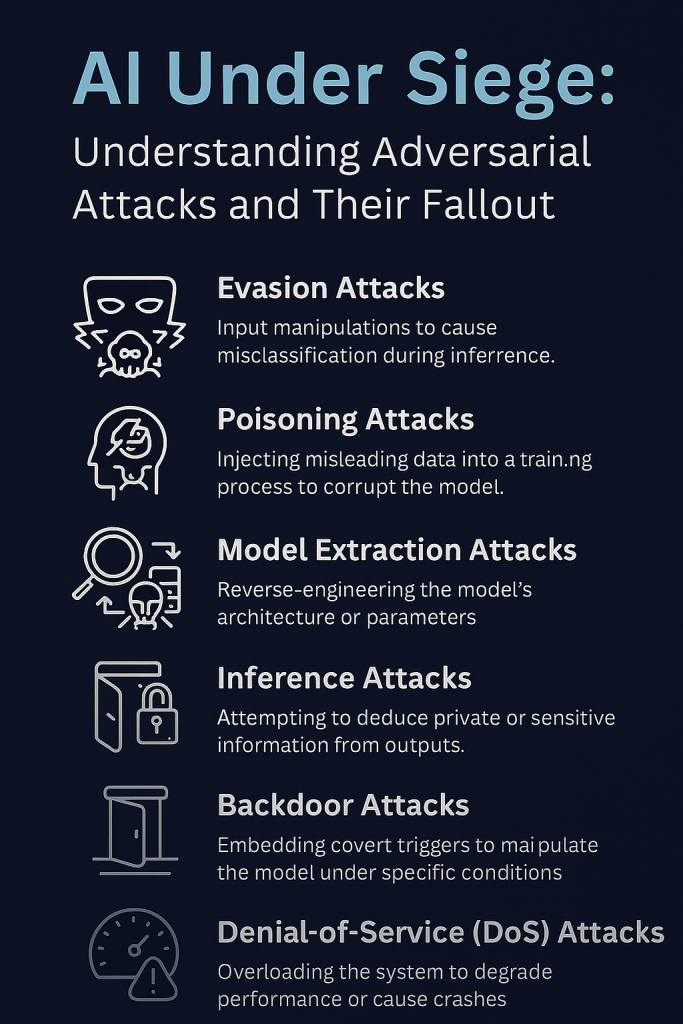
AI adversarial attacks exploit vulnerabilities in machine learning systems, often leading to serious consequences such as misinformation, security breaches, and loss of trust. These attacks are increasingly sophisticated and demand proactive defense strategies.
The article from Mindgard outlines six major types of adversarial attacks that threaten AI systems:
1. Evasion Attacks
These occur when malicious inputs are crafted to fool AI models during inference. For example, a slightly altered image might be misclassified by a vision model. This is especially dangerous in autonomous vehicles or facial recognition systems, where misclassification can lead to physical harm or privacy violations.
2. Poisoning Attacks
Here, attackers tamper with the training data to corrupt the model’s learning process. By injecting misleading samples, they can manipulate the model’s behavior long-term. This undermines the integrity of AI systems and can be used to embed backdoors or biases.
3. Model Extraction Attacks
These involve reverse-engineering a deployed model to steal its architecture or parameters. Once extracted, attackers can replicate the model or identify its weaknesses. This poses a threat to intellectual property and opens the door to further exploitation.
4. Inference Attacks
Attackers attempt to deduce sensitive information from the model’s outputs. For instance, they might infer whether a particular individual’s data was used in training. This compromises privacy and violates data protection regulations like GDPR.
5. Backdoor Attacks
These are stealthy manipulations where a model behaves normally until triggered by a specific input. Once activated, it performs malicious actions. Backdoors are particularly insidious because they’re hard to detect and can be embedded during training or deployment.
6. Denial-of-Service (DoS) Attacks
By overwhelming the model with inputs or queries, attackers can degrade performance or crash the system entirely. This disrupts service availability and can have cascading effects in critical infrastructure.
Consequences
The consequences of these attacks range from loss of trust and reputational damage to regulatory non-compliance and physical harm. They also hinder the scalability and adoption of AI in sensitive sectors like healthcare, finance, and defense.
My take: Adversarial attacks highlight a fundamental tension in AI development: the race for performance often outpaces security. While innovation drives capabilities, it also expands the attack surface. I believe that robust adversarial testing, explainability, and secure-by-design principles should be non-negotiable in AI governance frameworks. As AI systems become more embedded in society, resilience against adversarial threats must evolve from a technical afterthought to a strategic imperative.
“the race for performance often outpaces security” becomes especially true in the United States, because there’s no single, comprehensive federal cybersecurity or data protection law that governs all industries in AI Governance like EU AI act.
There is currently an absence of well-defined regulatory frameworks governing the use of generative AI. As this technology advances at a rapid pace, existing laws and policies often lag behind, creating grey areas in accountability, ownership, and ethical use. This regulatory gap can give rise to disputes over intellectual property rights, data privacy, content authenticity, and liability when AI-generated outputs cause harm, infringe copyrights, or spread misinformation. Without clear legal standards, organizations and developers face growing uncertainty about compliance and responsibility in deploying generative AI systems.

Deloitte admits to using AI in $440k report, to repay Australian govt after multiple errors spotted
Click the ISO 42001 Awareness Quiz — it will open in your browser in full-screen mode
Protect your AI systems — make compliance predictable.
Expert ISO-42001 readiness for small & mid-size orgs. Get a AI Risk vCISO-grade program without the full-time cost.
Secure Your Business. Simplify Compliance. Gain Peace of Mind
Check out our earlier posts on AI-related topics: AI topic
InfoSec services | InfoSec books | Follow our blog | DISC llc is listed on The vCISO Directory | ISO 27k Chat bot | Comprehensive vCISO Services | ISMS Services | Security Risk Assessment Services | Mergers and Acquisition Security




